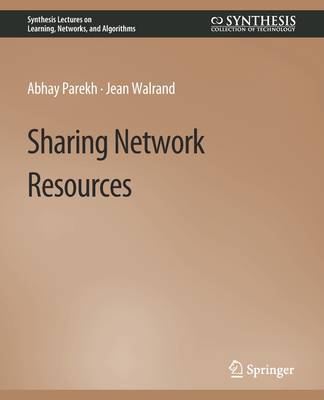
Bedankt voor het vertrouwen het afgelopen jaar! Om jou te bedanken bieden we GRATIS verzending (in België) aan op alles gedurende de hele maand januari.
- Afhalen na 1 uur in een winkel met voorraad
- In januari gratis thuislevering in België
- Ruim aanbod met 7 miljoen producten
Bedankt voor het vertrouwen het afgelopen jaar! Om jou te bedanken bieden we GRATIS verzending (in België) aan op alles gedurende de hele maand januari.
- Afhalen na 1 uur in een winkel met voorraad
- In januari gratis thuislevering in België
- Ruim aanbod met 7 miljoen producten
Zoeken
Omschrijving
Resource Allocation lies at the heart of network control. In the early days of the Internet the scarcest resource was bandwidth, but as the network has evolved to become an essential utility in the lives of billions, the nature of the resource allocation problem has changed. This book attempts to describe the facets of resource allocation that are most relevant to modern networks. It is targeted at graduate students and researchers who have an introductory background in networking and who desire to internalize core concepts before designing new protocols and applications. We start from the fundamental question: what problem does network resource allocation solve? This leads us, in Chapter 1, to examine what it means to satisfy a set of user applications that have different requirements of the network, and to problems in Social Choice Theory. We find that while capturing these preferences in terms of utility is clean and rigorous, there are significant limitations to this choice. Chapter 2 focuses on sharing divisible resources such as links and spectrum. Both of these resources are somewhat atypical -- a link is most accurately modeled as a queue in our context, but this leads to the analytical intractability of queueing theory, and spectrum allocation methods involve dealing with interference, a poorly understood phenomenon. Chapters 3 and 4 are introductions to two allocation workhorses: auctions and matching. In these chapters we allow the users to game the system (i.e., to be strategic), but don't allow them to collude. In Chapter 5, we relax this restriction and focus on collaboration. Finally, in Chapter 6, we discuss the theoretical yet fundamental issue of stability. Here, our contribution is mostly on making a mathematically abstruse subdiscipline more accessible without losing too much generality.
Specificaties
Betrokkenen
- Auteur(s):
- Uitgeverij:
Inhoud
- Aantal bladzijden:
- 132
- Taal:
- Engels
- Reeks:
Eigenschappen
- Productcode (EAN):
- 9783031792656
- Verschijningsdatum:
- 13/05/2014
- Uitvoering:
- Paperback
- Formaat:
- Trade paperback (VS)
- Afmetingen:
- 190 mm x 235 mm
- Gewicht:
- 272 g

Alleen bij Standaard Boekhandel
+ 115 punten op je klantenkaart van Standaard Boekhandel
Beoordelingen
We publiceren alleen reviews die voldoen aan de voorwaarden voor reviews. Bekijk onze voorwaarden voor reviews.









